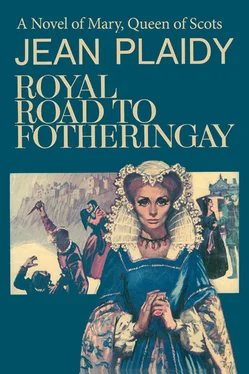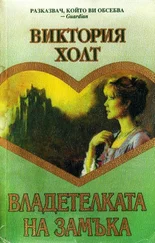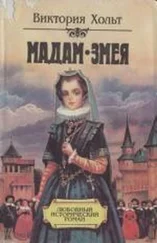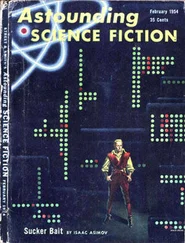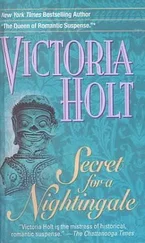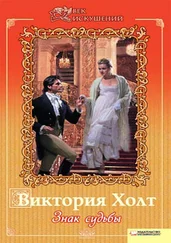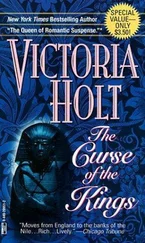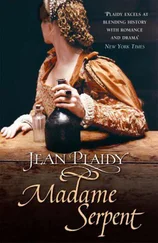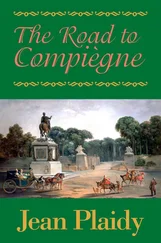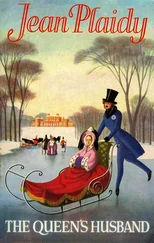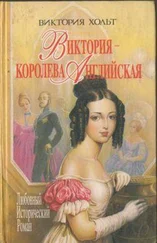Robert lifted his shoulders and smiled his charming Stuart smile. He began to talk of Bastian’s wedding.
ON SUNDAY EVENING Mary took supper at the house of Sir James Bal-four, and for company she had with her Lords Huntley, Bothwell and Cassillis. Bothwell was anxious that Mary should be where he could keep an eye on her. He had heard that Robert Stuart had warned Darnley. He could see that she was frightened tonight. She knew that her brother Moray had some reason for leaving Edinburgh other than the fact that his wife was slightly unwell. Moray—the sanctimonious man who could not look at evil except “through his fingers”—had always thought it advisable not to be on the spot when some deed was to be done which, though necessary to him, might earn the condemnation of all decent people. Moray’s departure was a sure sign that trouble was coming very near. None knew that better than the Queen.
She rose from the supper table saying that she had promised to call that night at the house in Kirk-o’-Field to see Darnley.
“Your Majesty has not forgotten the wedding?” asked Bothwell.
“Oh no. But I must see him first, for I have given him my promise to do so.”
“Then,” said Bothwell, “let us all go now to his apartment.”
“Shall we not be intruding on their Majesties?” asked Cassillis.
“Nay,” said Bothwell, “we three will play dice in a corner while the Queen talks with her husband.”
The party left, and guided by the flare of torches, passed through Black Friars Wynd to Kirk-o’-Field.
Mary was deeply aware of her lover’s presence. She knew that what happened tonight was of the utmost importance to him, and therefore to her.
Darnley was pleased to see her, but not so pleased to see her companions.
“We came, my lord,” said Bothwell, “to escort the Queen.”
“Come, sit beside me,” said Darnley eagerly to Mary.
Bothwell smiled. “Your Majesties may forget our presence. We shall be playing dice in this corner.”
Mary sat by the bed and Darnley said in a low voice: “Would you were staying the night.”
“I would, but I must attend the wedding, and there will be dancing till three of the morning. I could not come then.”
“Tomorrow night then?”
“Tomorrow night… if possible,” promised the Queen.
He began to talk then of his plans for the future, when he would leave this house and how happy they would be together. Mary listened, yet aware of the men playing in the corner; now and then looking up to find her lover’s eyes upon her.
She wondered: Was ever a woman asked to play such a part?
She rose at length and said: “I must not forget the wedding.”
“So soon!” complained Darnley.
She nodded and turned to the players. “My lords, I would go back now to dance at the wedding.”
They rose, bade farewell to the sick man and left him with his attendant Taylor.
As they came out of the house, Mary noticed with surprise the face of French Paris who was waiting with his master’s horse.
“How begrimed you are, Paris!” she exclaimed.
“Yes, Your Grace,” said the man, with an evil grin.
By the light of torches they rode back to Holyrood, where the wedding celebrations were in progress. Mary joined in the gaiety—dancing, singing and seeming as gay as any; but just after midnight she declared that it was a shame to keep the newly married pair from their nuptials, and she would conduct Margaret to her coucher at once that she might in person assist in the custom of breaking the benediction cake over the bride’s head, present her with the silver posset cup and throw the stocking.
When these ceremonies had been completed the Queen retired to her own chamber, and as soon as her women had prepared her for sleep, she lay on her bed, exhausted.
* * *
DARNLEY could not sleep. His room seemed to be filled with gloomy menacing shadows. He kept thinking of Robert’s words and of the uneasiness of the Queen. He had noticed the glances which Both well had sent in her direction from the dice table in the corner of the room. It was almost as though Bothwell were the King and Mary his humble subject. What had given him that impression? What had given him these uneasy thoughts? Was it this lonely, isolated house? Was it the thought of all his enemies? Was he remembering the hatred he had once seen in Mary’s eyes. He could sense evil near him. Those voices in the night—what did they mean? Were there evil spirits in the crypt below the house? Were his enemies hiding there in order to spring upon him in the dead of night? He raised himself on his elbow. He could make out the figure of Taylor lying at the foot of his bed.
“Taylor!” he whispered.
Taylor started up in alarm. “My lord?”
“I cannot sleep. I hear noises. Taylor, there is someone prowling about the house.”
Taylor was listening. “It is but the wind, my lord.”
“No, Taylor. I think not. Quiet! Listen with me.”
“My lord, shall I wake the servants?”
“How many are there in this house, Taylor?”
“Only the three, my lord: Nelson, Symonds and my own servant.”
“Have they said aught of noises in the night?”
“No, my lord.”
“They sleep deep in their little gallery. But then… any who prowl about the house would not come for them. Jesus! I shall be glad when we leave this house. I like it not. I shall leave it tomorrow.”
“My lord,” said Taylor in a whisper, “there is someone on the stairs.”
Darnley was out of bed. Taylor had seized his wrap and would have put it about him, but Darnley was at the door.
“Quick, Taylor. We must get out of this house. They come to murder me.”
“Your robe, my lord.”
But Darnley could not wait. He drew Taylor behind the door just as it was being cautiously pushed open; and two men came stealthily into the room.
They did not see the two behind the door and, as they approached the bed, Darnley, with Taylor behind him, speedily ran down the staircase and out into the garden.
Darnley heard someone cry: “After them!”
He recognized the voice as that of Archibald Douglas.
The cold night air made him gasp as it cut across his lightly covered body; he was wearing nothing but his nightgown. Dark figures moved toward him; he was caught and held in strong arms.
He gasped: “You… you could do this to a kinsman!” He was weak from his illness, but it was surprising what strength there could be in a sick man when he was fighting for his life. A damp rag was slipped across his mouth. He could scarcely breathe. He smelled vinegar as he fell unconscious to the grass.
Taylor was being suffocated by the same methods. Before he died he heard a voice ask: “Shall we take them back?”
“Nay,” came the answer. “They’re too heavy and time is short. We must be well away from Kirk-o’-Field in ten minutes’ time. Leave them here. They’re near enough to the house and there’ll be no trace of them by morning.”
STEALTHY FIGURES moved about the house.
The plans had gone awry. Darnley and his man, Taylor, were to have been strangled in their room. There was no time to take them back. There was only time to put a safe distance between the conspirators and the house in Kirk-o’-Field. They started toward Holyrood, but before they reached the palace they heard the roar of the explosion. The citizens were running out of their houses. The guards of the palace saw men with blackened faces entering it; and there was one of these whose bulk betrayed him; and on the night that Darnley was murdered and the house in Kirk-o’-Field blown sky-high, Bothwell was seen by many with his guilt upon him.
THE QUEEN was startled out of her sleep by the explosion. She rose in her bed crying out in terror. Seton was beside her.
Читать дальше
